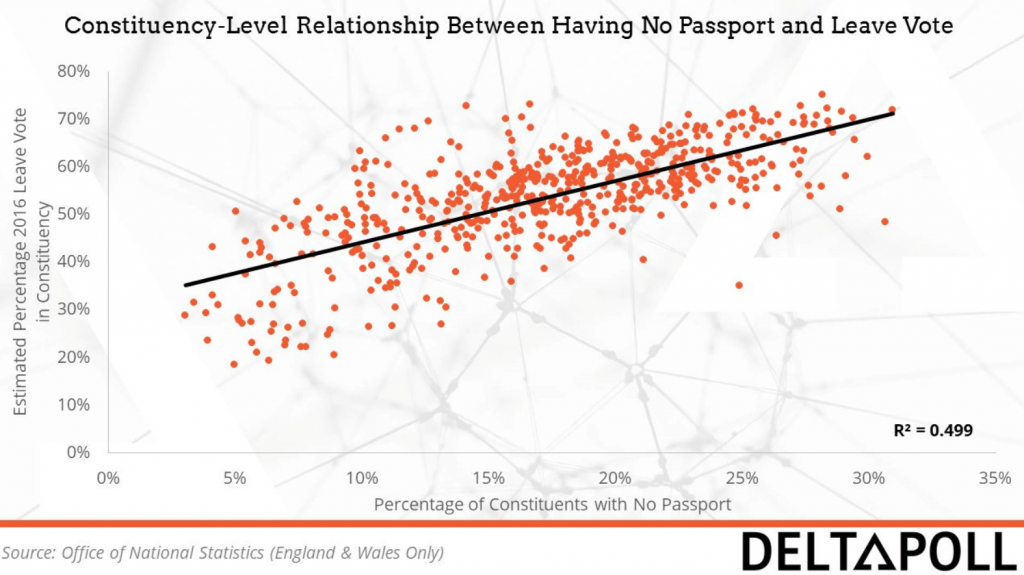Why the LDs and LAB could be the main beneficiaries of compulsory voter ID

BoJo’s move could hurt the Tories most
The above chart by Deltapoll should be a warning to Mr. Johnson about the dangers to his party of pressing forward with voter ID. It was published 2 years ago and shows the constituency relationship between having no passport and voting leave. As can be seen there is a correlation – the smaller the proportion with passports in a constituency the greater the chance it voted Leave.
I have not been able to find similar data for driving license holders but I am sure that it would be a similar picture. We do know that about 50% of those with driving licences do not renew than when they get to 70 – and the oldies are much more likely to be Tories.
We also know from poll after poll that the leave-supporting section of the electorate is the prime source of Tory votes. The latest YouGov has the Leave voting segment going 70% for the Tories with 13% going to Labour and 3% to the LDs.
It has been estimated that about one in six British adults don’t have a passport and about one in four don’t have a driving license. Yes special arrangements can be made to provide some sort of ID but putting another impediment in place for these sections of the electorate is surely going to impact on their likelihood to vote.
Voter ID is a solution looking for a problem and there’s no indication it would solve anything. At GE2019 there was less than one case of potential impersonation per constituency most due likely to other errors
Mike Smithson
UPDATE: These are the markeThis market relates to whether the UK government re-introduces any legally enforceable restrictions on social contact in England related to the spread of coronavirus, following the legal end of restrictions on social contact (currently expected to take place on 19 July 2021). Examples may include, but are not limited to, the mandatory wearing of face masks on public transport or the closure of pubs/nightclubs. For the purposes of this market, restrictions will not include any regulations on international travel or any regulations related to self-isolation or quarantine. For the purposes of this market, ‘re-introduce’ does not require any restrictions to exactly replicate previous restrictions. If the UK government does not end restrictions on social contact in 2021, and thus could not ‘re-introduce’ restrictions, this market will be void. Dates in this market relate to when any restrictions come into force in England, rather than the date on which they are announced. All times and dates in this market are in UK time. Clarification (14 July 2021): This market refers to mandatory England-wide measures introduced by the UK government. Any measures that are introduced locally or by individual companies (e.g. Transport for London only) will not count towards the settlement of this market. Clarification (6 September 2021): If ‘vaccination passports’ are required for entry to nightclubs or other events, this market will be settled for yes, so long as the measure satisfies the other conditions in the market rules, i.e. that it is mandatory, implemented by the UK government, England-wide and legally enforceable. Clarification (12 October 2021): If vaccines become mandatory for people working in care homes at any point in 2021 (https://www.gov.uk/government/publications/vaccination-of-people-working-or-deployed-in-care-homes-operational-guidance/coronavirus-covid-19-vaccination-of-people-working-or-deployed-in-care-homes-operational-guidance) this market will be settled for yes, so long as the measure satisfies the other conditions in the market rules, i.e. that it is mandatory, implemented by the UK government, England-wide and legally enforceable.